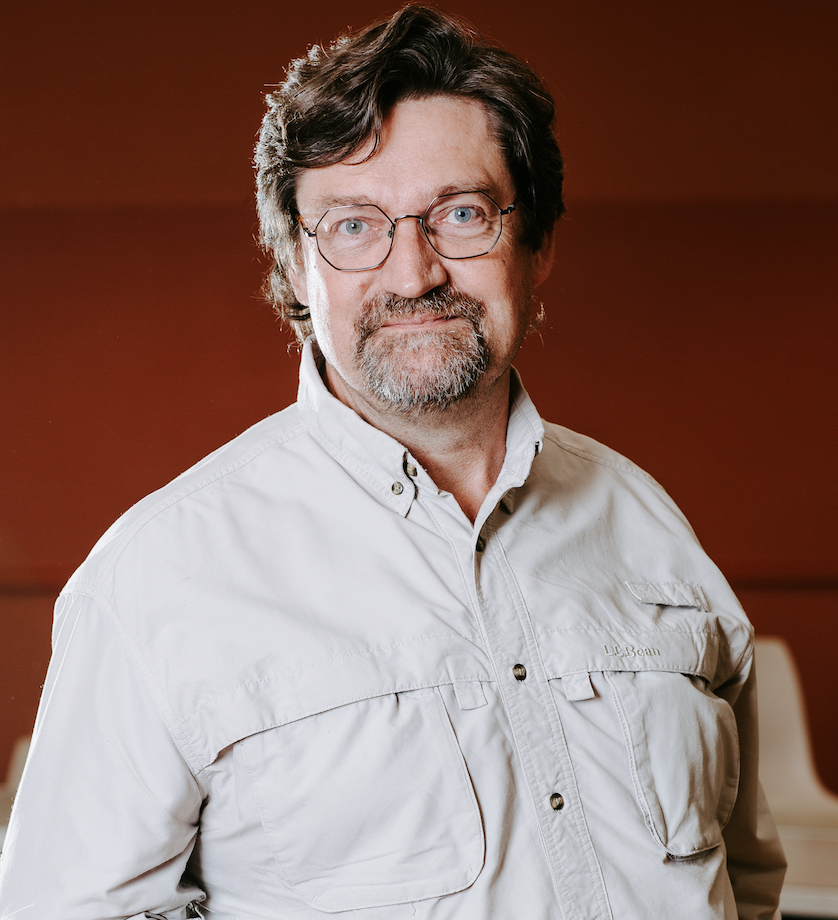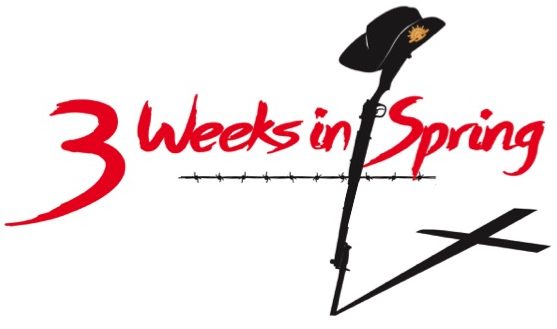
John Dwyer has performed as Deuteronomy in Cats, Donatella and the Police Chief in Phantom of the Opera (Blue Mountains Musical Society), Franz in The Sound of Music (Richmond Players), Mr March in Little Women (Ruby Productions), Mr Tinsworthy in 9 to 5 the Musical and Sergeant Fogarty in Chicago (Penrith Musical Comedy Company), and Jim Hacker in Yes Prime Minister (Boxboards Theatre Company). He was also the producer of Urinetown with Blue Mountains Musical Society.
In 3 Weeks in Spring John is playing the roles of Lord Mayor Richard Watkins Richards and Lieutenant Colonel William Kinsey Bolton. Here he talks about his involvement with the show:
I decided to audition for 3 Weeks in Spring because I heard a member of the production team’s compelling vision for the show. I knew I had to be a part of it, either on or off the stage. I also feel a very personal connection to the legacy of our WWI heroes, as my paternal great grandfather, Percy Mingo Dwyer, and maternal grandfather Leonard Bevan Harcourt Lloyd, were both ANZACs.
I auditioned for the role of Monash. I have so much empathy and respect for the role he played in the Gallipoli campaign, and the legacy he left as a military leader. Through my work with veterans here in Australia and also in the USA, I’ve learned that Monash is still revered by those who serve, as a highly strategic and compassionate leader, somewhat ahead of his time. Lachlan O’Brien was ultimately chosen to play the role of Monash and he’s an excellent choice for many reasons. I’m thrilled to have been given the two roles of Watkins and Bolton, and the opportunity this has provided to gain greater insight of those on the front and at home.
As a performer, playing real people creates a strong sense of responsibility to represent them with the integrity and respect they deserve. Both of the characters I portray in the show are real people, and the opportunity to portray them has motivated me to research, and to the best of my ability, synergise with them and their WW1-related experience. Both characters not only had a positive impact during the war, but also made positive contributions to society which have been sustained until the present day.
Sir Richard Watkins Richards was Lord Mayor of Sydney in 1914-1915 and then again in 1919-1920. In this production he is portrayed as a man striving to maintain a sense of positivity and joy during the very unsettling beginnings of the Great War. While gravely aware of the impact the war is having on local families, he is totally committed to ensuring the Sydney Easter Show of 1915 is a spectacular celebration for all, and a positive distraction from the troubling times abroad. Following the war, and consistent with his strong connection with the community, Richards established the Lord Mayor’s Patriotic Fund, as well as being an executive member of the Red Cross Society.
Lieutenant Colonel William Kinsey Bolton led the 8th Battalion (largely formed of recruits from rural Victoria) as they landed at Gallipoli in the second wave on 25 April 1915, where they experienced their first engagement in the battlefield. After an unsuccessful sortie alongside British and French troops at Krithia, the 8th Battalion took part in the battle at Lone Pine. Bolton returned to Australia in August of 1915 due to ill health but remained committed to supporting our military personnel. He was elected as the inaugural president of the Returned Sailors and Soldiers Imperial League (now the Returned and Services League or RSL) in 1916; a post he held for three years. He also served as a senator in the Nationalist Party of Victoria from 1917 to 1923.
Something I learned about the Gallipoli Campaign while doing the show really shocked me. I understood that conditions for the troops were very unpleasant, but I was horrified to learn that they spent months in trenches surrounded by decaying bodies of allied and enemy soldiers. There were so many, and disposing of them was so challenging, that they resorted to burying them in the walls and under the floors of the trenches. It’s confronting to imagine the horrific physical and mental impact those conditions must have had on the men, particularly when some of those bodies were mates or relatives.
The most remarkable new experience for me in relation to this production has been the recording of our double album. The studio recording process was intense, invigorating, and at times unnerving. In recording my solo pieces, I was challenged to deliver my parts in a manner that I hadn’t anticipated. To be honest, I left the studio wondering how it could possibly come together as a high-quality soundtrack, but I have been gobsmacked by how fabulous the finished album sounds.
The vocal arrangements of this new production are quite stunning and there are a few particular songs where I believe the audience will be moved by the combination of the powerful lyrics and the harmonies. While some of the songs will invoke a chuckle or two, I won’t be surprised to see some tears in the audience from time to time, and the finale makes the hair on the back of my neck stand up every time.
3 Weeks in Spring pays homage to the ANZAC men and women, as they embarked on our first major military campaign as independent nations. While providing some sense of the terrible conditions and human toll of trench warfare, as well as the negative impact of poor strategic leadership from the mother country, the show highlights the resilience and camaraderie of the troops, and the moments of relief from our Aussie larrikin spirit.
For me, the core message is that our nation has never forgotten the significance of our ANZACs, and our respect for the men and women who made the ultimate sacrifice remains strong in our hearts more than a century after we landed at Gallipoli.
My hope is that the audiences will come away from the theatre with a newfound pride and respect for our ANZAC heroes. Particularly for the younger audiences, I believe the storytelling of those first few weeks at Gallipoli will spark a greater sense of curiosity about the motivation and courage of our men and women and the sacrifices they were willing to make for the sake of our nation.
